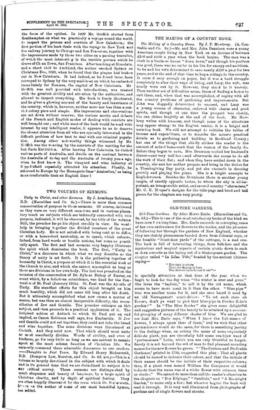TWO VOLUMES OF SERMONS.
Unity in Christ, and other Sermons. By J. Armitage Robinson, D.D. (Macmillan and Co. 6s.)—There is more than common concentration of purpose in these sermons. Of course, delivered as they were on very different occasions. and in various places, they touch on subjects which are indirectly connected with this purpose, indicated, it will be observed, by the title of the volume Still, the preacher keeps his object steadily in view. He woof I help in bringing tegether the divided members of the great Christian body. He is not satisfied with being coat nt to differ, or with a benevolent neutrality, so to speak, which refrains, Indeed, from hard words or hostile actions, but /*mans practi- cally apart The first and last sermons very happily illustrate the spirit which dominates the book. The first, "Unity in Christ," is a discourse in which what we may describe as the theory of unity is set forth. It is the gathering together of humanity in Christ, a purpose at which it is the essential work of the Church to aim, and which she cannot accomplish as long as there are divisions in her own body. The last was preached on the occasion of the consecration of Dr. Ryle as Bishop of Exeter, an event which, by a felicitous coincidence, was fixed for tha Con- version of St. Paul (January 25th). St. Paul was the Apeatle of tlnity. His steadfast efforts for this object brought on him much hostility, which did not cease till long after his death. But it ultimately accomplished what now seems a matter of course, but was then an almost insuperable difficulty, the recon- ciliation of Jew and Gentile. The preacher enlarges on this Subject, and then proceeds to a practical application of it. The incipient schism at Antioch to which St Paul put an end implied, as Canon Robinson well says, two Eucharists. If Jew and Gentile could not eat together, they could not take the bread and wine together. The same divisions were threatened at Corinth. And they exist now. That which should most unite us meat manifestly divides. Words of civility, and even of kindness, go for very little as long as we are content to remain apart at the most solemn function of Christian life. We esenestly commend these admirable discourses to our readers. --Thoughts in Past Years. By Edward Henry Bickersteth, D.D. (Sampson Low, Marston, and Co. 3s. 6d. net.)—This is a volume so largely devotional in the subject with which it deals and in its general tone that we are disinclined to subject it to any critical survey. These sermons are distinguehed by much eloquence and beauty of language, by a large spirit of Christian charity, and by depth of spiritual feeling. They are often happily illustrated by the verse which Dr. B ceersteth, k' In as the author of some of our most beautiful hymn*, has added.


























































 Previous page
Previous page